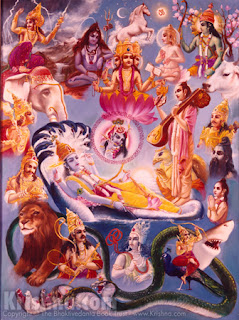The entire content of this mail is from Swami Chidbhavananda's translation of The Bhagavad Gita, published by Ramakrishna Mission.
Varieties of Sacrifices - Slokas 23-33
1 Gita Sloka every day - Chapter 4 -JnanaKarmaSanyasa Yoga - Sloka 29
 |
| Krishna in All Creation |
Apane juhvati pranam prane apanam tatha apare I
Prana apana gati ruddhatva prana ayam para ayanah II sloka 29
अपाने जुह्वति प्राणं प्राणे अपानं तथा अपरे ।
प्राण अपान गति रुद्धत्वा प्राण आयां पर अयनाः ।। श्लोक २९
Yet others offer as sacrifice the outgoing breath in the incoming, and the incoming in the outgoing, restraining the flow of the outgoing and incoming breaths, solely absorbed in the regulation of the life energy.
There is a close relationship between man's mentation and his breathing. The regularity or otherwise in one has a corresponding effect on the other. Unwholesome mentations such as fear, lust and anger disturb the flow of breath. Calmness, contentment, affection and such healthy attitudes lead to rythm in breathing. Conversely, if the flow of breath be voluntarily regulated, its effect on the mind is beneficial. Yogis took note of this fact and evolved a series of pranayama.
Breathing through the mouth is to be avoided. Air taken in through the nostril is known as apana and that thrown out, as prana. Inhaling is technically called puraka and exhaling rechaka. Arresting the breath within or without is kumbhaka. Violent and incorrect practice of pranayama shatters the nerves and brings in neural complications. Correct practice of it heals diseases, tones the system, enhances health and pacifies the mind. Attractive and inviting as this science is, adepts in it are few and quacks many. A novice will therefore do well to refrain from it.
A yogi is endowed with a serene mind may practise deep rythmic breathing avoiding kumbhaka as far as possible. A good walker takes no note of his legs. Similarly a sadhaka who does good pranayama is hardly ever obsessed by it. Measured breathing and a blissful attitude constitute a good pranayama.
No comments:
Post a Comment